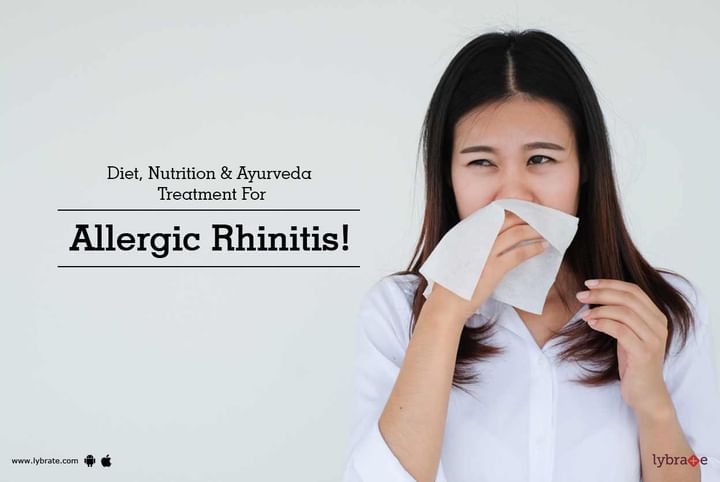Diet, Nutrition & Ayurveda Treatment For Allergic Rhinitis!
Breathing is inhalation and exhalation, where oxygen is inhaled into and carbon dioxide is released from the body. Air passes through the nose, which has fine hair and mucus to filter out suspended particles in the air like pollen. When the person’s immunity is weakened or is highly reactive, the mucosa reacts to many substances which are generally present. This is known as allergic rhinitis.
Types: Depending on the occurrence, it can be:
- Seasonal: For instance, in spring when there is too much pollen in the air; known as hay fever. This is an acute rhinitis and subsides with a change in weather.
- Chronic: This is when the body reacts to some normal substances like eggs, animal dander, extreme cold, dust, mites, etc. via an allergic reaction.
Causes of allergic rhinitis as per Ayurveda
- Mandagni – low digestion strength
- Kapha vruddhi – increase of Kapha dosha
- Allergens – external factors such as pollen, dust etc
- Residing with pet animals
- Exposure to humidity, dust, cold
- Virudh aahara – wrong food combinations
- Long term intake of drugs like aspirin, leading to depleted immunity and making the person prone to dust allergies.
Symptoms:
- Runny nose for prolonged periods of time
- Chronic congestion
- Persistent sneezing
- Teary eyes
- Fever and headache
Ayurveda believes that this is due to excessive kapha dosha. So, in order to manage allergic rhinitis, two approaches should be taken. Foods which increase kapha should be avoided, and elimination of kapha from the body should be targeted.
Non-medical ways to combat allergic rhinitis:
Prevention has a big role to play in managing allergic rhinitis.
- Whether it is animal dander, eggs, tomatoes, or extreme cold, if you know it could cause an attack, stay away from it.
- Chew foods properly to ensure through absorption of vitamins and minerals, which are essential for immunity
- Boil water with a spoonful of turmeric and a pinch of salt and drink it regularly
- Basil and mint leaves can be boiled in water and consumed for improving allergic rhinitis
- Clove and pepper can be chewed to get immediate relief
- A mixture of crushed clove and pepper mixed with turmeric and honey works wonders for allergic rhinitis
- Eat seasonal fruits and vegetables. They are more likely to be chemical-free, are cheaper, fresher, and definitely more nutritious.
- Carrots eaten with a bit of fat produce the best defense against allergic rhinitis, as the beta-carotene in it is fat soluble.
- Whole grains, green leafy vegetables, seasonal fruits and vegetables, and dairy products, contain a number of vitamins and minerals which help in fighting allergic rhinitis
- Ayurvedic remedies like shilajit and guduchi boost immunity function
- Neem, Ashwagandha, liquorice, cinnamon, tulsi, and curcumin are proven remedies for allergic rhinitis.
- Panchakarma specifically aimed at rhinitis include Nasya, Dhoomapana (medicated smoking) and emesis (vaman ). This helps in eliminating kapha which is believed to cause allergic rhinitis.
Though allergic rhinitis is a very common condition, the treatment is also easy and many home remedies help in managing the condition.
Lifestyle improvement:
- Always keep cloves and black peppers with you. Immediately keep two pieces of it in mouth when you feel of attack.
- At the pre attack or attack rub Nilgiri oil , Mint oil, or pain balm on chest and get fomentation.
- Keep watch on the elements that causes irritation for you and stay away from this.
- Use mask while driving vehicle or going through public places.
- Always take warm water bath.
- Do not expose to hot sunrays.
- Regularly take inhalation of steam.
- Regularly go for morning walk in warm weather.
- Do sufficient exercise.
- Do not reside in dark or dump places. Get fresh air.
- Do not get sleep at day time or immediate after dinner.
- Take sufficient rest. If you wish to discuss about any specific problem, you can consult a doctor.



+1.svg)
